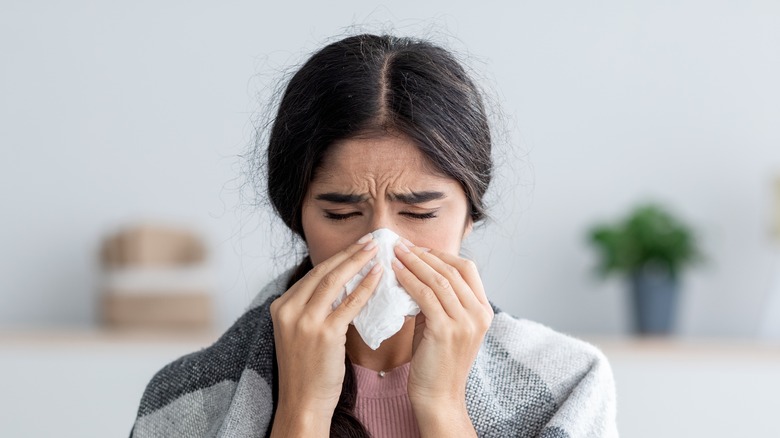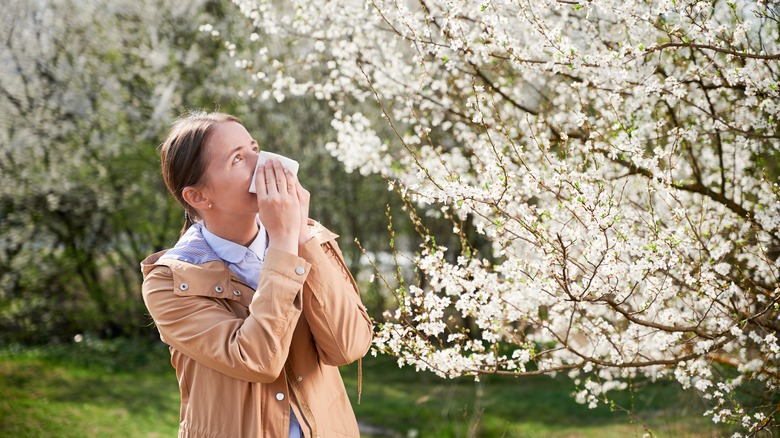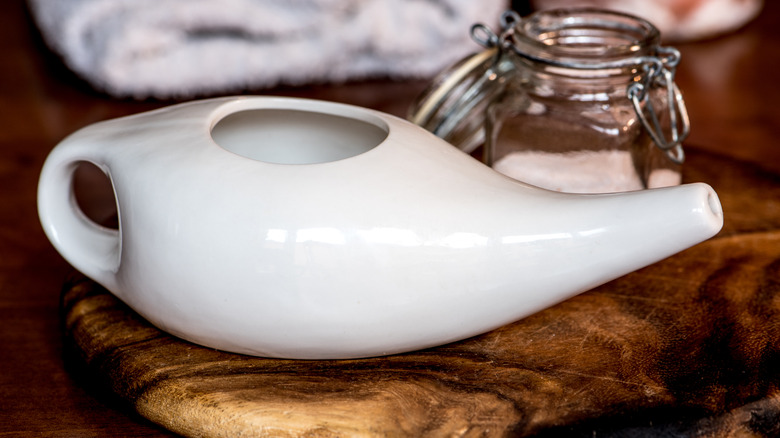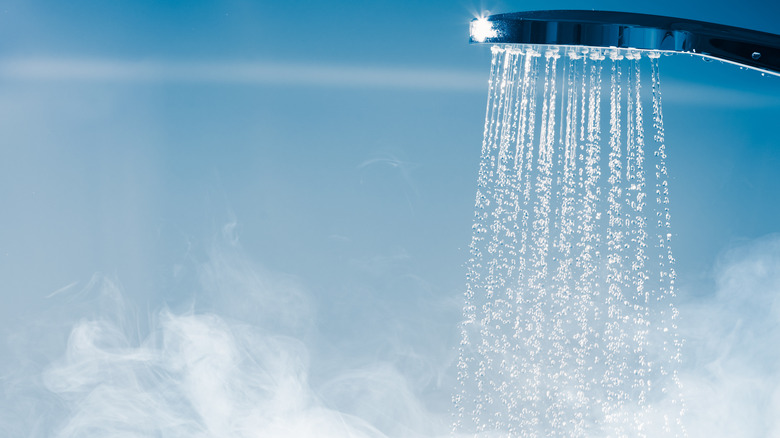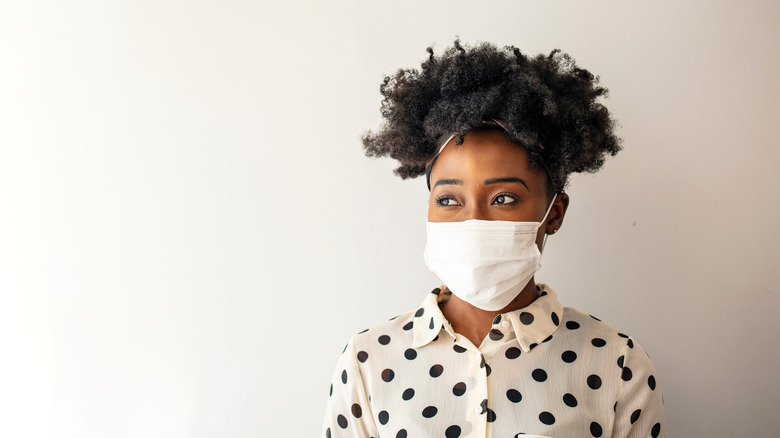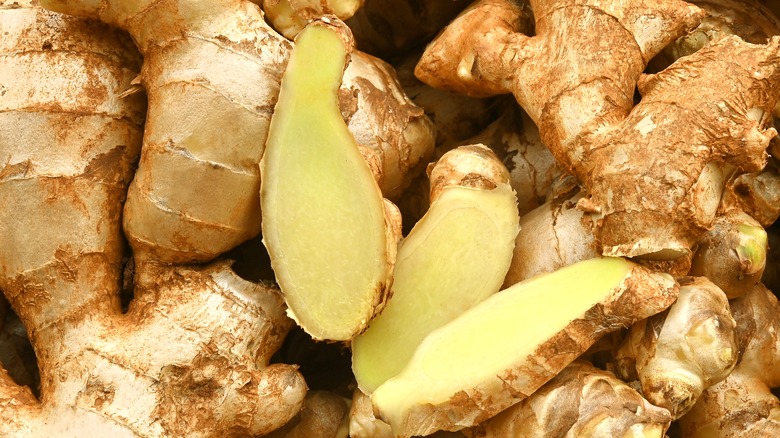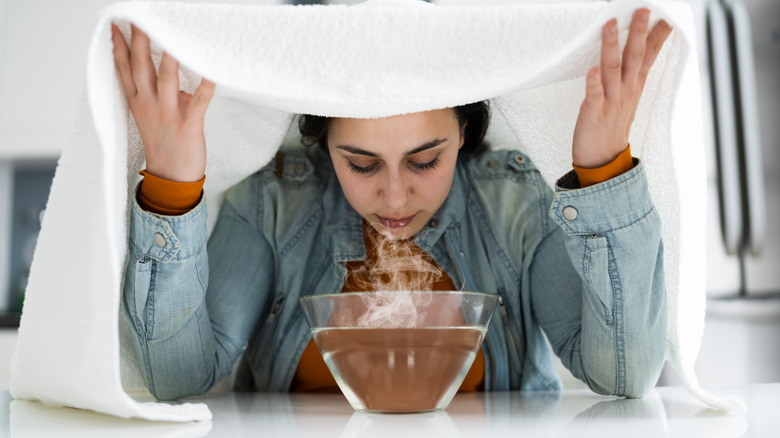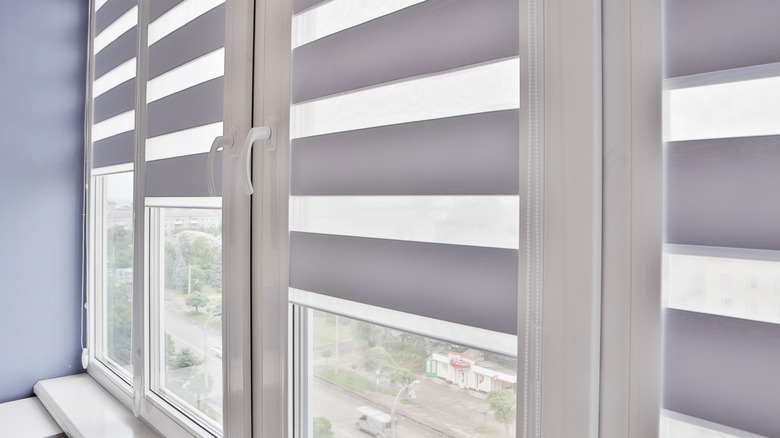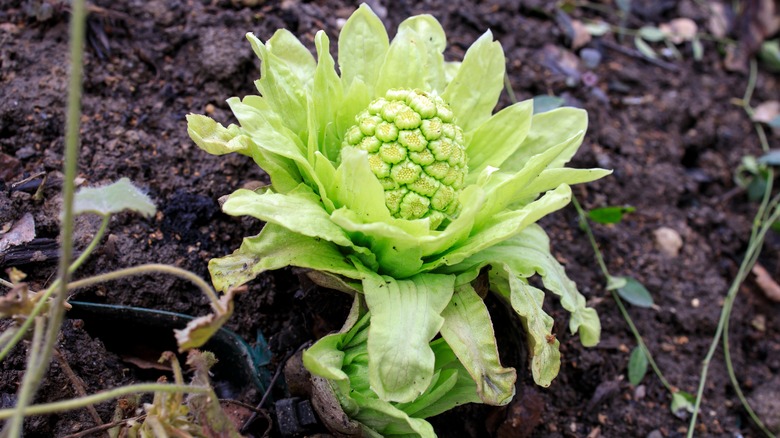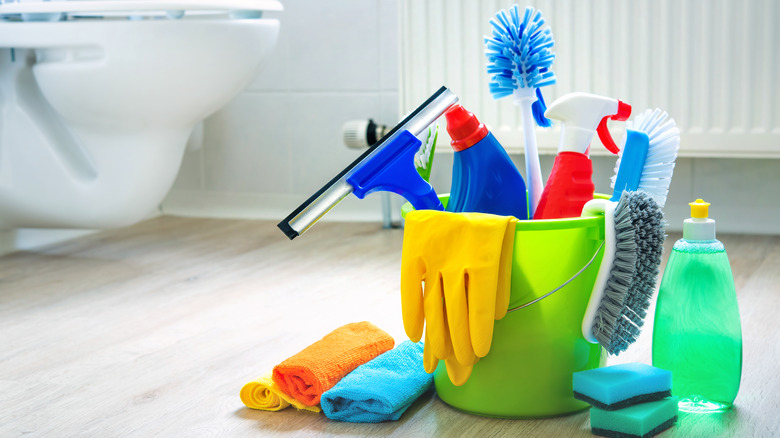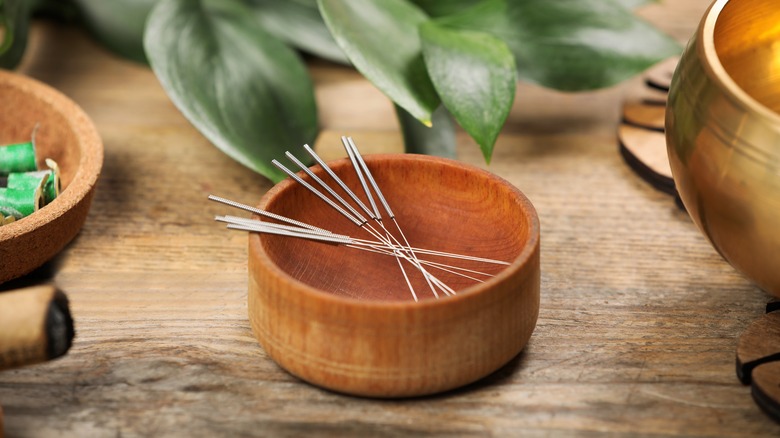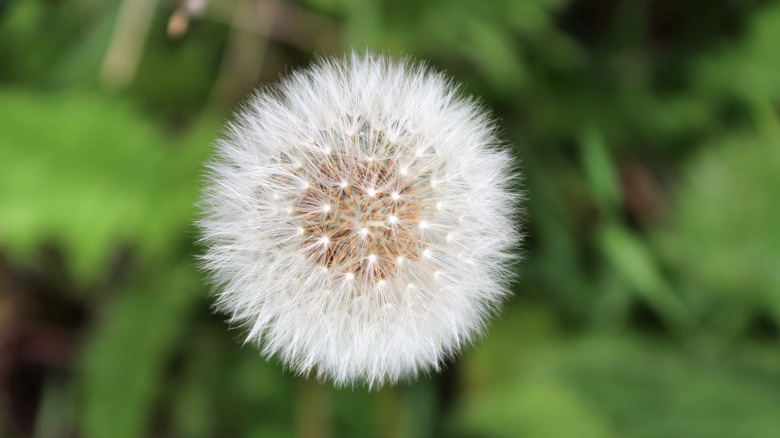14 Tips To Curb Allergy Symptoms
Allergies suck. We all know it, and there's no point in pretending otherwise. The most glorious summer day of the year can quickly turn sour when allergies are triggered, and up to 60 million people every year in the United States have to contend with the symptoms of allergic rhinitis, according to the CDC. And in the search to treat these allergies, people spend their money –- and a lot of it. Approximately $18 billion is spent on controlling allergy symptoms every year, burning a hole in the pocket of consumers and pleasing pharmaceutical companies to no end (per the American College of Allergy, Asthma & Immunology).
But here's the thing, folks. While forking out cash on antihistamine medication will no doubt help keep your symptoms controlled, it's not the only way to look after yourself during allergy season. There are a lot of ways to curb your allergies, and some of them are not only more simple than you think but can keep valuable cash in your pocket while you're enjoying the warmer months (more money to spend on hanging out with your friends, right?). Let's take a look at our top tips to keep allergy symptoms manageable.
As tempting as it is, stay out of your garden
Once spring and summer roll around, that garden that sat dormant behind your house for months can suddenly spring to life. Now, while this is a joyous moment, and your first instinct might be to run out into it instantly and prop up a chair, we'd advise you to take a moment. Spending extended time in the garden during allergy season can create issues for those with allergic rhinitis, with mold spores and pollen being released, triggering symptoms, as Allergy UK states. This can be especially troublesome if you're prone to getting out in your garden first thing in the morning or as the sun sets, or if it's slightly windier, as pollen counts are much higher in these conditions.
The good news, though, is that you can make some simple adjustments to your garden to make it more allergy-proof. Try and opt for flowering plants, as these will be less impactful for people with allergies, thanks to their pollination coming from insects, as WebMD says. It's also worth avoiding certain types of plants in your garden, such as trees like cedar, oak, ash, and willow, and cypress and juniper shrubs. As grass can release pollen, ask a family member or friend to cut your grass for you, and wear long-sleeved clothing when you're out in your garden, avoiding touching your face.
Keep your sinuses clean
If you have allergies, you'll know how much your sinuses can be affected. But when congestion strikes, there's help at hand. Not only can antihistamines assist in reducing congestion in the first place, but sinus irrigation can clear your nasal passage quickly and efficiently and is a cheap way of doing so by rinsing the allergens and mucus out (per Mayo Clinic).
You'll need an irrigation device and a saline solution to do this. A neti pot, which is kind of like a small teapot with a curved spout, can be great for this (per the FDA). Start by mixing up a solution of warm water, salt, and baking soda in your pot, and then lean over a sink or bowl, tilting your head to one side. Then, place the spout of the neti pot into the nostril closest to the ceiling. The water should flow into your nose naturally, but if you have a squeezable pot, squeeze it gently to get the water moving. The solution should travel through your upper nostril and out of your lower nostril, taking mucus and any allergens still in your nose with it. Clear out your nostrils by blowing your nose gently, and then repeat on the other side. Ensure that you change your saline solution every time you do this, and don't do it with tap water, as this can carry bacteria.
Steer clear of cigarettes
If you smoke or live with someone who does, you may have more things to worry about than your allergies being triggered, with the wide range of health risks that smoking and secondhand smoke can deliver (per the CDC). But you also shouldn't discount the effect that tobacco smoke can have on allergy symptoms, as Healthline points out. Believe it or not, you can be allergic to tobacco smoke, and if you already have allergies, you're even more likely to be triggered by it. These symptoms are largely the same as classic allergy symptoms, with congestion, watery eyes, sneezing, and itchiness being commonplace, alongside wheezing and headaches.
It's also worth bearing in mind that smoking around children can cause them to be more susceptible to allergies, according to research published in the Korean Journal of Pediatrics. While it is possible to treat tobacco allergies or allergic symptoms that are exacerbated by smoke by using medications, it's far preferable to halt smoking altogether, not the least because it'll stop you from experiencing the other health effects that it can deliver.
Before sleep, take proper precautions
Although allergy symptoms are often more noticeable during the daytime, they can be an absolute nightmare when you're trying to sleep, with allergic responses resulting in difficulty sleeping, as well as an increased likelihood of experiencing sleep apnea (per Sleep Foundation). But pre-empting this, and preparing yourself before you hit the hay, can set you up for a seriously restful slumber.
The preparation starts before you even go to bed: Ensure that throughout the day, you're keeping your windows and doors closed as much as possible to stop allergens coming in on the wind and settling in your room. It's also important to consider the allergens you might bring into the room with you on your clothes and put your clothing directly in the washing basket when you come in to avoid it spreading. A shower before heading to bed can also be a good idea so that you can wash off any pollen or allergens that you've picked up during the day. Finally, timing your allergy medication dose to take it closer to the time you go to sleep will heighten the chance of making it through the night restfully, although it's wise to consult your doctor before you alter any dose timings.
Put a mask on
For many, masks weren't a regular feature of life before the COVID-19 pandemic. But nowadays, it's likely that you have access to them pretty easily. And if you do, it might be worth considering wearing it to limit your allergy symptoms, given their effectiveness in protecting you from allergens, according to Allergy UK. When the pollen count is high outside, your mask will act to stop it from entering your airways, thereby irritating them and causing an allergic reaction. Your mask may also have a further benefit by keeping the air around your mouth and nose moist and warm, which can calm your nasal passage and prevent it from flaring up as much when it comes into contact with allergens.
It's important to practice proper mask care, however. Ensure that you pick a mask that can effectively block allergens coming through (i.e., not one that's especially porous), and if you use a cloth one, wash it regularly to stop allergens from building up on it. It's also worth carrying around spares and keeping them in an area where allergens can't collect on them.
Introduce certain foods to your diet
It might feel like allergy prevention is impossible sometimes and that your only recourse is to either stay inside forever or take antihistamines like there's no tomorrow. But did you know that what you eat can affect how you respond to allergens? Simple, commonplace foods could provide benefits to your allergy symptoms, in part due to their anti-inflammatory effects, according to Healthline. Ginger and turmeric are two such foods that have anti-inflammatory properties.
And one other food that could help with your allergies might surprise you: Pollen. Bee pollen, to be precise. Eating bee pollen has been found to provide a range of health benefits, from antifungal to anti-inflammatory effects, according to research published in Food and Chemical Toxicology. And if you're lucky enough to track down bee pollen that's locally produced, you may benefit even more. "There is some evidence to support the consumption of local bee pollen to help build your body's resistance to the pollen that you are allergic to," says registered dietitian Stephanie Van't Zelfden. All the more reason to head down to the farmer's market at the weekend, folks!
Get the steam flowing
Allergic rhinitis can be a nightmare for our sinuses, causing congestion, runny noses, and other symptoms that make airflow difficult. But targeting your sinuses with therapies can considerably reduce symptoms, and steam inhalation is one such therapy that anyone can do. "Steam inhalation can help open sinuses and airways and reduce inflammation," states Allergy & Asthma Network immunologist and allergist Purvi Parikh via Men's Health. The steam soothes your sinus tissue and eases pressure, thereby allowing mucus to clear and for you to breathe easier.
And the best part is all you need is a bowl, a kettle, and a towel. Fill up a bowl with boiling water from your kettle, and then make a tent over the back of your head, lean over it and breathe in deeply. Be careful, of course, not to lower your head too much so it doesn't touch the water. Breathe in and out for a few minutes, repeating throughout the day. Bear in mind this won't provide long-lasting relief, but in the short term, it could make you feel a lot more comfortable.
Keep your windows shut
The summer months might feel like the ideal time to throw open your windows wide and get that sweet, warm breeze through your home. But if you experience seasonal allergies, this could be one of the worst things you can do. As the wind blows into your house, it brings with it airborne pollen and spores, as Penn Medicine points out. Not only is this a problem immediately upon breathing it in, but these allergens can then linger on surfaces and get into your fabrics, creating an allergenic environment long after you've shut your windows again.
The solution? Keep those windows shut, folks. While we appreciate that this may make the long summer months uncomfortable, you're far better off using an air conditioner to keep your house warm, as this can reduce pollen exposure. Using a HEPA filter device can also assist in keeping your home allergen-free, as they work to catch allergens like pollen and dander and keep your air clean (per WebMD). You can also buy vacuum cleaners that have HEPA filters fitted to help you catch any pollen or spores that have settled in your carpets.
Hydration is key
Staying well-hydrated is important whether it's allergy season or not, thanks to its vital role in keeping our organs working properly, our digestion running smoothly, our body temperature under control, and generally keeping us alive each day (per the Harvard T. H. Chan School of Public Health). But when your allergies are in full swing, hydration becomes even more essential. "Studies have shown that when you're dehydrated your body produces higher histamine levels and that drives allergies," states American College of Allergy, Asthma and Immunology spokesperson and allergy specialist Neeta Ogden (via CBS News). These elevated histamine levels then exacerbate your symptoms.
What makes things even more complicated is that certain allergy treatments, like decongestants, can make dehydration more likely, making it even more important to keep an eye on your fluid intake. Remember, too, that it's not just water that you need, as dehydration causes you to lose electrolytes, too. That's why Ogden suggests trying to compensate for any electrolytes lost by consuming additional minerals, potentially through the use of electrolyte powder. Certain foods, like bananas, kale, nuts, milk, and chicken, are all sources of electrolytes, too (per Healthline).
Antihistamines aren't the only treatment
Anyone well-versed in allergy management will likely have a packet of antihistamines within pretty easy reach. But it's important to remember, friends, that it's not just antihistamine medication that can help to reduce allergy symptoms and that there is a range of other treatments that could reduce your allergic response.
One such treatment is by taking butterbur, a variant of marsh plant that could have potent effects on symptoms thanks to its effects on histamine production, according to Healthline. One study published in Clinical & Experimental Allergy seemed to demonstrate this. Participants who had allergies were asked to take butterbur, and it was found that after just five days, histamines were lower, and their symptoms were milder. Leukotriene, the chemical in your body that causes inflammation and allergy symptoms when you're triggered by an allergen, was also present in lower quantities after taking butterbur. Not bad, huh? Bear in mind, however, that butterbur should never be ingested in an unprocessed form, as it can contain pyrrolizidine alkaloids, which may produce harmful effects like liver damage. It's also the case that some people may be allergic to butterbur itself, so if you know you have an allergy to daisies or anything in the flower's family, it may be best to steer clear.
Your pets might need more attention
We all love our four-legged friends, and kicking back with your dog next to you or your cat on your lap is the ultimate way to relax after a long day. But when your allergies start to kick in, you might have to pay a little extra care to your pets –- and not how you might think. When your pet comes back in from its daily wander outside, its fur may well have collected a shedload of pollen on it, which then makes its way into your home and onto your sheets, your sofa, or wherever your animal chooses to lay their head (per A.Vogel). Pets can also be sites of allergens in themselves, as their dander can carry allergy-producing proteins that might be prompting your runny nose, as The Humane Society says.
As such, it's important to prepare your pets. Bathing them more regularly, ideally once a week, will both keep their coats clean of any allergens they've picked up in the outside world and reduce the amount of dander on them. When allergy season is at its peak, you may also want to consider grooming them outside so that you're not brushing pollen directly onto your carpets. It can also be worth creating "pet-free" zones in your home, and especially in your bedroom, to ensure that they're not getting allergens in areas you spend a lot of time in.
Try to avoid harsh cleaning products
Keeping our homes clean can be one of the best ways to reduce allergic responses, but it can also have a negative effect. While heavy-duty cleaning products can effectively clear up allergens, they may also induce irritation in themselves, according to WebMD. "The cleaning product does not trigger an allergy, but it is an irritant ... And an irritant can cause the same symptoms as an allergy," states immunologist and allergist Julie McNairn via Everyday Health. These symptoms are, as you might expect, things like itchy eyes, a runny or blocked nose, congested sinuses, sneezing, and potentially an asthma attack.
It's good, therefore, to steer away from cleaning products that contain certain ingredients, like ammonia, formaldehyde, and sodium lauryl sulfate. Don't be fooled by brands that market themselves as natural or "green," either, as although they may have different production methods; they can still contain irritating chemicals. Your best bet is to keep it simple. "The bottom line is that baking soda and vinegar can get just about anything cleaned, in different concentrations for different uses," McNairn advises.
Consider getting acupuncture
Acupuncture can be used for a wide array of health conditions, potentially helping to reduce the severity of symptoms from fibromyalgia, osteoarthritis, dental issues, and a range of other aches and pains (per the Mayo Clinic). But did you know that it may be helpful for folks who have allergies, too? According to a review of studies published in Autonomic Neuroscience, there's evidence that points towards the treatment of allergic rhinitis symptoms through acupuncture. One study, in particular, published in the Annals of Internal Medicine, found that when people with seasonal allergic rhinitis were treated with acupuncture over eight weeks, they exhibited "statistically significant improvements" and fundamentally had a better quality of life.
However, it's important to bear in mind that while these results are promising, the Autonomic Neuroscience review stresses that acupuncture should be considered a complementary treatment and not a treatment in itself. Fundamentally, more study needs to be done to find out the exact efficacy of acupuncture on allergies, as Healthline says. Importantly, too, acupuncture has yet to be explicitly proven to be effective as a treatment for other allergic responses, like contact dermatitis, although some studies have shown promising results.
When pollen counts are high, adjust your behavior accordingly
Look, folks, let's be real. When it's hay fever season, it's pretty hard to avoid it. Short of shutting yourself in an airless room until summer's over, sooner or later, you may have to experience symptoms.
But -– and there's a big but –- certain adaptations you make to your behavior can significantly reduce the severity of your allergic response. The first adjustment is to become more aware of the pollen counts outside, as when it's high, your symptoms will likely be more severe. A quick Google search or watching your local TV weather report will usually give you a window into this (per the Mayo Clinic). If the pollen count is looking especially high, pre-empt your symptoms by taking allergy medicine before you're exposed to it. You may also want to limit outside activity on especially pollen-heavy days, particularly if it's windy or dry weather, and to do your outdoor chores in the middle of the day, when the conditions are usually less allergenic. On days like this, too, don't be tempted to put your sheets outside to dry: While you may enjoy the fresh scent it gives your clothes, it may also cause pollen to get trapped in them, which you then bring into your home.

